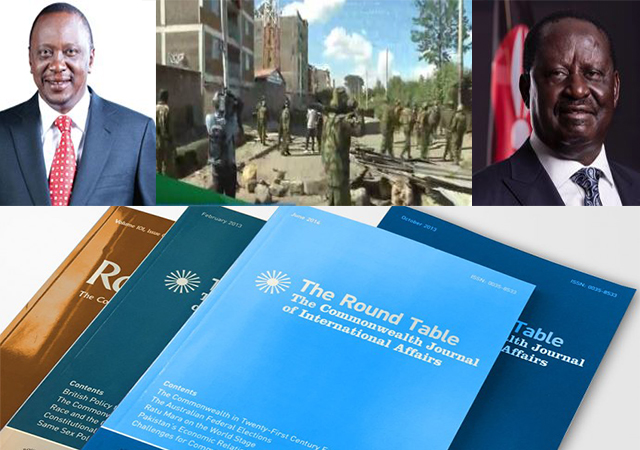 Uhuru Kenyatta (Facebook), conflict in Kenya (NASA TV), Raila Odanga (Facebook), Round Table Journal.
Uhuru Kenyatta (Facebook), conflict in Kenya (NASA TV), Raila Odanga (Facebook), Round Table Journal.
Raila Odinga, the veteran presidential candidate of the opposition National Super Alliance (Nasa) coalition, got his response in early on the eve of the re-run presidential elections, calling for fresh polls to be held within 90 days and renaming his opposition alliance a “resistance movement”. It was not the most ringing endorsement of the impending vote. On 26 October, the opposition would, Odinga said, campaign to defend democracy and try to convene a people’s assembly to chart the way forward, boycotting businesses linked to the regime.
Uhuru Kenyatta was duly returned to State House the next day in a formality that produced results worthy of North Korea – winning 98.25% of the vote to Odinga’s 0.96%, albeit on a paltry 38% turnout, CNN reported. Africa Confidential suggested: ‘‘Surely no president can look on a 98% majority with as much dismay … [Kenyatta’s] massive winning margin robbed the victory of legitimacy. The low turnout of 39% did credit to neither man. In an atmosphere of violence and intimidation, with an outcome that was a foregone conclusion, Kenyans stayed at home en masse.’
Odinga had long since pulled out of the reprise of August’s elections, which were annulled by the supreme court after a petition from Nasa challenged the results. Nasa had refused to take part if the electoral commission’s chief executive, Ezra Chiloba, was not removed (Update, September 2017). Odinga also demanded that all digital records be made public as he claimed it would prove vote-fixing by the Independent Electoral and Boundaries Commission in the August elections. No election was held in 25 constituencies due to violence and threats directed at electoral commission officials, the Standard reported, and soon after the election four county assemblies on the coast had already passed a Nasa motion seeking to nullify the repeated election, calling for fresh polls within 90 days and a national assembly. Though there was little violence compared with the bloodbath of 2008, Kenyans were arming themselves after the election, the New York Times reported.
Kenyatta faces a big problem of credibility. With 12 million of the registered electorate staying away, Africa Confidential said, ‘many of them feel locked out of the electoral system.’ Writing in the New York Times, Maina Kiai, a Kenyan human rights lawyer, concluded: ‘A flawed election begets a controversial rerun begets a colossal sham – that’s the story of this presidential race. And now Kenya is in an even murkier, and more dangerous, situation than it was.’



